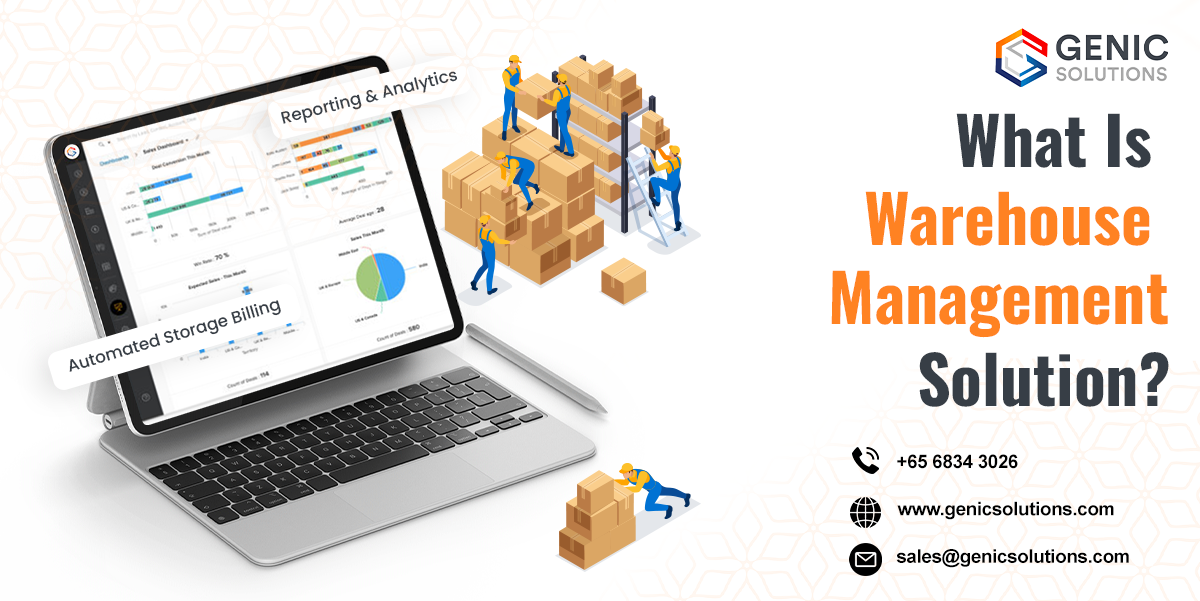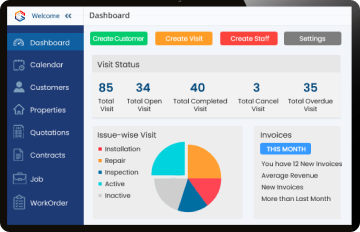Managing a warehouse efficiently is a complex task involving various activities such as inventory management, order processing, and space optimization. A Warehouse Management Solution (WMS) is designed to streamline these tasks, ensuring that products are stored, tracked, and delivered accurately and promptly. This software application plays a crucial role in enhancing the overall efficiency and accuracy of warehouse operations.
By automating key processes, a WMS helps businesses reduce errors, save time, and improve customer satisfaction. Understanding the components and benefits of a WMS is essential for any company looking to optimize its warehouse management practices.
Now, we are going to explore what WMS is, how it works, and why it’s so crucial for businesses.
What is Warehouse Management Solutions?
A Warehouse Management Solution is a software application designed to support and optimize warehouse operations. From the moment products enter a warehouse until they leave, WMS manages the entire process. It tracks inventory, oversees order fulfillment, and ensures efficient use of space and resources. By doing so, it helps businesses save time and money while improving customer satisfaction.
The Key Components of a WMS
A robust WMS typically includes several key components that work together seamlessly to manage warehouse activities.
Let’s delve into these components to understand how they contribute to the overall functionality of the system.
- Inventory Management
Inventory management is at the heart of any WMS. This component helps businesses track and manage their stock levels in real time. It ensures that the right products are available when needed, reducing the risk of stockouts or overstocking. With accurate inventory data, companies can make informed decisions about purchasing and production.
- Order Management
Order management involves tracking customer orders from the moment they are placed until they are delivered. A WMS streamlines this process by automating order processing, picking, packing, and shipping. This not only speeds up the order fulfillment process but also minimizes errors, ensuring that customers receive the correct products on time.
- Warehouse Layout Optimization
An efficient warehouse layout is crucial for maximizing space and improving productivity. A WMS helps design and optimize the warehouse layout by suggesting the best locations for storing different products. It considers factors such as product size, weight, and frequency of access, enabling workers to pick items more quickly and efficiently.
- Labor Management
Labor management is another critical aspect of a WMS. This component tracks and manages the workforce, ensuring that tasks are assigned efficiently. It helps monitor employee performance, schedule shifts, and manage workloads. Businesses can reduce labor costs and improve overall productivity by optimizing labor management.
- Reporting and Analytics
A comprehensive WMS provides detailed reports and analytics on various warehouse activities. These insights help businesses identify trends, monitor performance, and make data-driven decisions. Whether it’s analyzing order fulfillment rates or tracking inventory turnover, the reporting and analytics feature of a WMS is invaluable for continuous improvement.
How Does a WMS Work?
To understand how a WMS functions, let’s walk through a typical day in a warehouse using this system.
- Receiving Goods
When goods arrive at the warehouse, the receiving process begins. Workers scan the barcodes on the products, which are then entered into the WMS. The system updates the inventory levels in real time, ensuring that the stock records are always accurate.
- Storing Products
Next, the WMS suggests the optimal storage locations for the received products. Workers follow these suggestions and store the items accordingly. The system records the exact location of each product, making it easy to find them later.
- Order Picking
When a customer places an order, the WMS generates a picking list. This list tells workers which items to pick and their storage locations. By following the list, workers can quickly gather the required products, reducing the time spent searching for items.
- Packing and Shipping
After picking the items, they are brought to the packing area. The WMS guides workers through the packing process, ensuring that each order is packed correctly. Once packed, the system generates shipping labels and updates the order status. The packed orders are then shipped to customers.
Benefits of Implementing a WMS
Implementing a WMS offers numerous benefits to businesses of all sizes. Here are some of the most significant advantages:
- Improved Accuracy
One of the primary benefits of a WMS is improved accuracy in inventory management and order fulfillment. By automating these processes, the system reduces human errors, ensuring that customers receive the correct products.
- Increased Efficiency
A WMS streamlines warehouse operations, increasing overall efficiency. Tasks such as order picking, packing, and shipping are optimized, reducing the time and effort required to complete them. This efficiency translates to faster order fulfillment and higher customer satisfaction.
- Better Inventory Control
With real-time inventory tracking, businesses have better control over their stock levels. They can quickly identify when products are running low and reorder them promptly. This prevents stockouts and overstocking, leading to cost savings.
- Enhanced Customer Satisfaction
By ensuring accurate and timely order fulfillment, a WMS enhances customer satisfaction. Customers receive their orders correctly and on time, which builds trust and loyalty.
- Cost Savings
While implementing a WMS requires an initial investment, the long-term cost savings are substantial. Improved efficiency, reduced errors, and better inventory control all contribute to lower operational costs. Additionally, businesses can make more informed decisions, further optimizing their expenses.
How to Choose the Right WMS?
Selecting the right WMS for your business is crucial for maximizing its benefits. Here are some factors to consider when choosing a WMS:
- Scalability
Ensure that the WMS can scale with your business. As your warehouse operations grow, the system should be able to handle increased volume and complexity.
- Integration
The WMS should seamlessly integrate with your existing systems, such as your enterprise resource planning (ERP) and customer relationship management (CRM) software. This integration ensures smooth data flow across different departments.
- Ease of Use
A user-friendly interface is essential for minimizing training time and maximizing productivity. Choose a WMS that is intuitive and easy to navigate.
- Customization
Every business has unique needs. Look for a WMS that can be customized to meet your specific requirements. This flexibility ensures that the system aligns with your operational processes.
- Vendor Support
Reliable vendor support is crucial for addressing any issues that may arise. Choose a vendor with a strong track record of providing excellent customer support and regular software updates.
Final Words
A Warehouse Management Solution is an indispensable tool for modern businesses aiming to optimize their warehouse operations. A WMS can significantly impact a company’s bottom line by improving accuracy, increasing efficiency, and enhancing customer satisfaction. When choosing a WMS, consider factors such as scalability, integration, ease of use, customization, and vendor support to ensure you select the best solution for your needs.
Investing in a WMS is a strategic decision that can lead to substantial long-term benefits, making it a worthwhile consideration for any business with warehouse operations. Companies like Genic Solutions offer tailored WMS solutions designed to meet the unique needs of various industries, ensuring that your warehouse operations are always running smoothly and efficiently. With Genic Solutions, you can trust that your business will benefit from the latest in warehouse management technology.







